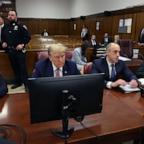Libby Defense: Cheney Won't Testify
Feb. 13, 2007 — -- The defense attorneys for former White House aide I. Lewis "Scooter" Libby said today they no longer plan to call Vice President Dick Cheney to testify in the CIA leak trial.
Defense attorney Theodore Wells also said Libby would not be called to the stand.
"The defense obviously felt the downside of calling the vice president outweighed the potential benefit that the defense could hope to achieve with his testimony," said Gregory Craig, a former assistant to President Clinton who also served as a lawyer in Clinton's impeachment trial.
Asked about calling a defendant to testify at his own perjury and obstruction of justice trial, Ed MacMahon, who represented Zacarias Moussaoui, the only person in the United States to face charges for the Sept. 11 terrorist attacks, said, "They would have to convince the jury he made a mistake without having him say it."
Libby faces perjury and obstruction of justice charges in the investigation of the leak of CIA operative Valerie Wilson in 2003. The criminal investigation was launched after Wilson's identity was published in a column by Robert Novak after her husband, former Ambassador Joseph Wilson, openly criticized the Bush White House for twisting pre- war intelligence, which led to the war in Iraq.
Earlier today, Cheney's national security adviser, John Hannah, took the witness stand at the perjury trial of his former boss Libby and described Libby as a key adviser to the vice president who had "an awful memory".
Libby's defense team is attempting to demonstrate that Libby, who was concurrently Cheney's chief of staff and national security Adviser, was so overwhelmed by national security and foreign policy issues that he could not adequately remember specific facts when he was interviewed by government officials in the investigation.
Hannah described Libby's memory lapses as a common occurrence in the West wing. "I'd show up six to seven hours later and have him repeat what I had told him earlier in the day."
Hannah testified that while Libby was good at remembering ideas and concepts, he was very bad at remembering where he had heard particular information.
"That was a fairly regular pattern with Scooter," Hannah said.
Outlining Libby's workday for the jury, Hannah testified that it often began around 7 a.m. with an intelligence briefing at the vice president's residence and ended late in the evening, sometimes at 9 p.m. Hannah described the hours in between as filled with a plethora of meetings and briefing memos that Libby digested daily.




